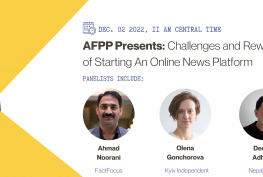By Waqas Banoori
When I was a high school student just a decade ago, I took computer science and I can still recall my excitement for that one hour class when we would use computers. We had no internet access and we were only allowed to use Microsoft Office. I can still remember what a joy it was to play pool or solitaire for a few minutes.
Fast forward to 2013: I am now on Twitter, working at the Pittsburgh Post-Gazette and tweeting about the Pittsburgh Marathon. Thanks to the Alfred Friendly Foundation.
By the time I graduated college, the technological advancements were way ahead in Pakistan. Entering my first newsroom, the computer usage was extensive. Yet, social media was still only a private affair.
Slowly, social media came to the newsrooms in Pakistan. Yet, social media still has not uncovered its base, partially due to the large number of illiterate and poor in the country. It is generally viewed as unimportant. As it continues to grow with the younger generation, it will become more accepted.
People in Pakistan are familiar with Facebook and Twitter, and the latter one is primarily used by the educated. They aren’t, however, aware of a number of other outlets such as Tumblr and Pinterest. Frankly, I hadn’t ever heard of them myself. I only became aware of them during my fellowship.
On the contrary, social media is part of daily life here in the US. But, over here, everything is digital. You can even order food through smart phones.
Recently, I attended the Pennsylvania News Conference in Harrisburg, and I had an opportunity to learn about using of social media. While going through the session, I learned about mistakes that journalists make while using social media. I also came to know that the ‘journalistic ethics’ is equally as important in social media as it is in print media.
Personally, I now find myself able to better understand the advantages of the social media.





